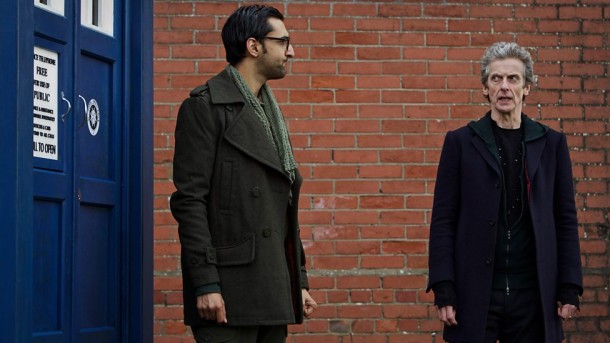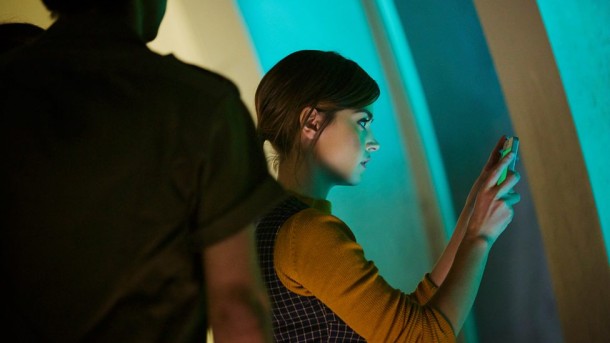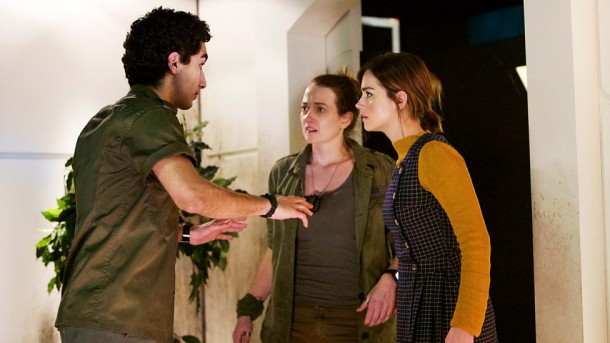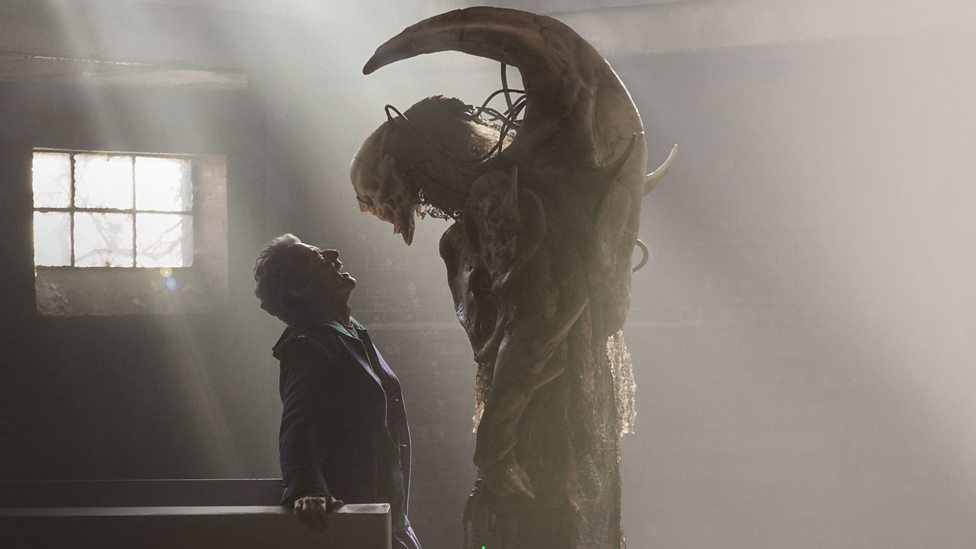WARNING: Spoilers ahead! Do not pass GO if you have not seen the episode, do not collect 200 fake dollars.
Last week’s Doctor Who episode, Under the Lake, ended on a cliffhanger with the Doctor’s ghost found floating in a flooded science facility turned lake. That was bonkers enough, and yet this week’s episode not only gave us a strong second half of the plot, it confirmed what we were all hoping: Season 9 is good. Really good. Phenomenally good.
The show opens on the Doctor talking to the camera, breaking the fourth wall, about one of his favorite musicians, Beethoven. It was a neat soliloquy, and a gateway into how the Doctor’s world works. His time travel can cause bootstrap paradoxes, more easily defined as the future causing an event in the past to happen. Yes, I admit that when the Doctor asks us to “Google it,” I actually did. The example of Beethoven reveals that the Doctor had gone back in time to have the composer sign the sheet music, only to discover that the artists had never written it in the first place. Ludwig copies the work and it becomes his, creating said paradox. Or, something to that effect. It all matters in a way, but before we get to that part the Doctor explains all of this while riffing Beethoven’s 5th on an electric guitar, morphing it into the title theme.
Side note: Dammit, I want this as my ring tone now.

In many episodes during Moffat’s reign, believability has been thrown out the window, with physics and canon bent and altered and made up to serve whatever purpose the writers agree upon. I zone out at these points; time travel needs to be understood by the viewers without the constant wrench being jammed in.
Not this time. The Doctor’s fourth wall excursion leads us right into the expected big twist of this two week story arc: the Doctor himself was the cause of the flood that overtook the town in the past, necessitating it in order to save the future, where the rest of his friends are stuck. It’s all crazy, but it’s also super believable and therefore enjoyable to ingest.
I love when this happens in Who. In most cases it’s good, but this week it was ridiculously delicious.

The show takes place along two-ish timelines, as we’re treated to a 1980 Irish town (“before the flood”) used for Cold War drills and the same town 150 years in the future, now under water. The Doctor’s goal is to discover why the mysterious ship landed here, with the conclusion that we were all leaning towards: it’s a hearse for a creature known as the Fisher King. There’s a great device that’s employed here to further the dual timeline notion. The Doctor can communicate with his companions across time and space via mobile phone, and in this specific case it’s an iPhone 5. This is the first blatant use of a piece of branded phone technology on the show, as previous phones were fairly generic smart phones. This is an iPhone, and the Doctor is Facetiming Clara. Neat!

Anyhoo, the hook is that the Doc sees his ghostly future self, and asks to communicate with it. At some point during this two episode spin, we actually get the feeling that the Doctor is going to die but that it’ll be some sort of trick or regeneration technique — or timey-wimey stuff. And it turns out to be true. The notion of the paradox mentioned above is that the Doctor sees his ghost, later realizing that he can create a hologram to mimic the look and make something akin to what the “ghosts” actually are: transmitters. Yep, the Doctor created his own ghost after seeing his ghost in the future.
In fact, seeing the Doctor communicate with himself is bizarre yet scintillating, as he’s mentioned several times in the past that he really shouldn’t be doing that else it cause some chaotic implosion. I loved the wordplay here. “Doctor, such an honor. I’ve always been a huge admirer. This is really delighting. Finally, someone worth talking to,” he says to his future ghost. It reminds me of Blink, the first Weeping Angels episode of Doctor Who, in which the Doc is trapped in the past and communicates via prerecorded VHS tape to someone in the future.

The entire thing has a sense of mind-blowingness to it, and the way it all makes sense in the end leaves me wanting to watch the two-parter again to catch the hints along the way.
Yes, there’s more to the episode than just the paradox. The acting is again spot on, as characters on both sides of the timeline played each part with plenty of emotion and draw. It’s easy to feel saddened when characters are killed off, as they’re played so engagingly by the actors. Jenna Coleman’s Clara was perhaps a the most disappointing in her acting, but even that is addressed when Cass wonders why it’s so easy and detached for her to sacrifice others for the Doctor’s plans. It’s refreshingly self-referential, as we wonder every show how the Doctor seems to sacrifice several for what seems like minimal return.
There are references to Russian Cold War propaganda and Chernobyl, Alien level claustrophobic horror and Victorian theatrics. The Fisher King himself is menacing, hulking and mostly terrifying. It’s a blatant reference to Arthurian legend, but with a nice alien twist. The much-hated Sonic Sunglasses actually have a use as well, providing the ability to create holograms and delete memories.
But it all revolves around that time plot device, and it’s something that Who has the ability to be good at but doesn’t always fully explore. I’m so glad it does so here. It adds layers of depth to an arc that has the makings of being one of the best in the last 10 years.
This is the Peter Capaldi Doctor Who that we’ve been waiting for.



No Comments